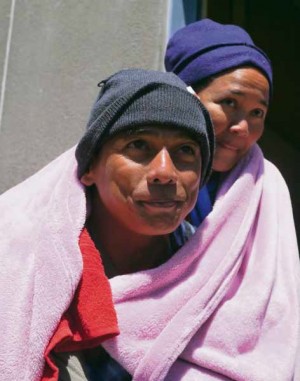Historic Robben Is. swim a struggle but enjoyable

VALENCIA and Medalla are swathed in towels to warm them shortly after their historic swim. CONTRIBUTED PHOTO
MANILA, Philippines—One was enjoying the moment; the other was just trying to survive.
Betsy Medalla and Julian Valencia, both accomplished triathletes, easily became the first Filipinos—and first Asians—to complete the Robben Island channel crossing on Sunday.
Their names are now officially included in the Record Book of Robben Island Swim in South Africa after completing the swim ahead of the three-hour target.
“During the swim I felt so alive. The sun was on my back. The water was cold but not painful. I enjoyed the moment,” said Medalla, 44, a mother of two.
Medalla, a veteran swimmer, clocked an “exceptionally fast swim” at two hours and 34 minutes, at par with a few South African swimmers on record.
Valencia, 40, a father of two, held on for dear life and finished the swim in two hours and 52 minutes.
“The last 700 meters were extra-difficult as I was losing muscle coordination due to fatigue and the cold. I was already on survival mode,” said Valencia.
Extremely painful
Valencia suffered from near hypothermia.
“It was extremely painful. All my muscles were contracting and shaking. I am very proud to have done it. Would I do it again? Probably not,” he said.
The pair swam for the charity event “A Rainbow of Hope: A Celebration of Philippines-South African Friendship,” which was organized by businessman and honorary consul of Georgia in the Philippines Buddy Cunanan, in cooperation with the Cape Long Distance Swimming Association (CLDSA), which supervises and certifies all Robben Island swims.
The swim was organized to commemorate the life of the late Nelson Mandela, former South African president and anti-apartheid revolutionary, and to raise money for the survivors of Super Typhoon Yolanda. Mandela was imprisoned on Robben Island for 18 years.
Medalla and Valencia started the swim at 8 a.m. from Robben Island and emerged from the icy waters in the Cape Town suburb of Bloubergstrand.
Braving the threat of great white sharks, poisonous jellyfish and water temperatures that went down as low as 11 degrees, the pair completed the trial without any cages or protection clothing. They wore standard regulation swimming attire.
As per the rules of the CLDSA, they had to swim from Robben Island and make it unassisted to the shore of Bloubergstrand, at least one meter from the waves, to be recognized as an official swim and to be placed in the record books.
Initially, the pair was supposed to swim 7.2 kilometers. However, they ended up covering a slightly longer distance of 8.6 kilometers as the captains of their guide boats had to change course to avoid rough ocean swells and perilous rocks.
Swimming at different paces, Medalla and Valencia had one guide boat each, with a skipper, rescue swimmer and a personal swim assistant.
Both swimmers reached the shore pale, exhausted and shivering intensely.
However, Valencia was visibly more affected by the cold and was clearly suffering from near hypothermia, muscle cramps and spasms.
Covered in towels
Unable to walk properly, Valencia was assisted by officials of the CLDSA, who immediately brought him to the Big Bay Lifesaving Club, where he was covered in warm towels and blankets and several hot water bottles.
Cunanan and members of the Cape Filipino community took turns embracing Valencia to give him bodily warmth in order to stop his shaking. It took over 45 minutes before Valencia could speak audibly or drink water and be fit enough to take a warm shower.
“Because of the cold, this swim was the most difficult physical challenge I have ever done. We are used to distance swimming in the Philippines but the cold of the Atlantic Ocean definitely made it challenging. We had to keep moving to keep our bodies heated,” said Medalla.
“Definitely, the mental aspect of this was extremely difficult. I said five rosaries during the swim and this gave me strength. The last part was the most difficult when we could see the shore but had to deal with the temperature that dropped drastically. This was when our mental toughness was tested,” she said.
Both swimmers spoke of the tremendous mental difficulty of the swim, particularly in the last kilometer when they were most exhausted and when the temperature abruptly dropped from 15 to 11 degrees.
Hardest swim
This was not only the pair’s coldest open water swim but also the longest at 8.6 km.
“This was the hardest thing I have ever done. I would take any Iron Man challenge any day of the week over this. I would be lying if I said that the thought of quitting didn’t cross my mind,” said Valencia after recovering.
“There were several times when the strain of the cold water was nearly unbearable, especially at the tail-end of the swim, and I questioned whether I could still go on. But it was the thought of all those supporting me back home and the people who were waiting for me on the shore that sustained me,” he said.
Upon reaching the shore, both swimmers were met by an ecstatic crowd that included their support group from the “First Filipino Robben Island Swim Team” and members of the local Filipino community.
